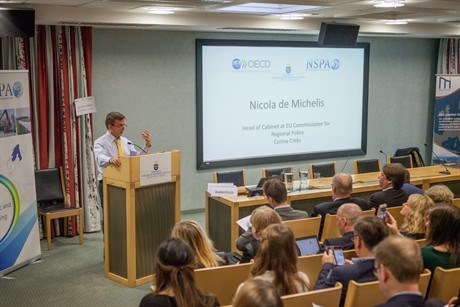NSPA Follow-up Forum - Understanding the OECD report
Following the launch of the OECD report, the Northern Sparsely Populated Areas arranged a Forum at the Swedish Representation to the EU. High level speakers put the report in a larger perspective and regional representatives discussed future priorities for the NSPA.

Satu Vehreävesa, chair for the NSPA network, opened the forum, happy to now have the OECD study to be discussed during the day. She was followed by Lars Danielsson, Head of the Swedish Representation to the EU, who welcomed the participants to the Swedish Representation and noticed that if "Brussels is the heart of EU, the NSPA regions must be the brain of Europe". He stated that Brexit will lead to a more diverse European Union and will affect the EU's funding for the Cohesion Policy.
The first keynote speaker, Director at the European Policy Center (EPC) Fabian Zuleeg, presented the state of play for the EU, including challenges with reduced budgets, but stated that "the link between spending's and output when it comes to education is rather weak". With this he emphasized that how money is spent and utilized is more important than the amount of money involved, encouraging the NSPA network to use the OECD report to utilize its resources.
Common challenges
OECD Policy Analyst Chris McDonald presented key statements from the report, pointing out some of the challenges that the NSPA regions have in common: the population is aging, and there is a lack of job growth and infrastructure.
McDonald presented one of the key questions, namely how the regions could utilize the refining of commodities, making the regions host more of the profitable part of industries. The way to make this is to build on the concept of smart specialization strategies for the NSPA regions.
The OECD report also insists that the regions should thoroughly scrutinize national strategies and regulations. McDonald ended by putting forward some ideas on how to now implement the OECD study for the NSPA regions and proposed the idea of arranging a follow-up seminar at OECD in Paris at about one and half year from now as a milestone to aim at.
Cohesion Policy
Nicola de Michelis, Head of Cabinet at EU Commissioner for Regional Policy, presented the EU Cohesion Policy, stating that it will most likely face big changes in the next period. The Cohesion Policy's value has been questioned, and Sweden is one of the countries trying to reduce the Policy's budgets. It is of immense important for all regions to now show the added value of the EU regional policy, as it is at this very moment the future of the policy is decided.

The Head of Cabinet highlighted the good value the OECD study delivers and pointed out ways for the NSPA network to use the OECD report to participate in the ongoing Cohesion Policy debates on the EU level.
Policy Officer at DG MARE in the European Commission, Alessia Clocchiatti, finished the presentations stating the report is "a good toolbox for further cooperation between NSPA and DG MARE" and put forward the importance the NSPA network plays for the EU Arctic policy work. There will be a meeting in Oulu in June where Commissioners and Foreign Ministers will discuss the future of EU's Arctic Policy with regional representatives and others as a part of the on-going Arctic stakeholder forum process.

Applying the OECD study
The participants were invited to a workshop to discuss what the NSPA regions would like to communicate to the EU, regarding investments in the regions in the context of the on-going Arctic stakeholder consultation and the future of the cohesion policy.
The event was concluded with general discussions on how the regions could implement policy recommendations of the OECD study, followed by closing remarks from Robert Uitto from Region Jämtland-Härjedalen who also invited all to the next regional NSPA Forum.
